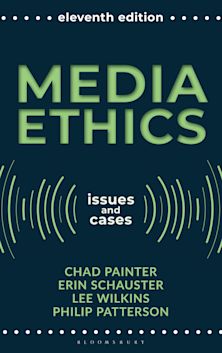- Home
- ACADEMIC
- Film & Media
- Media Ethics
- Privacy and Fame
Privacy and Fame
How We Expose Ourselves across Media Platforms
Privacy and Fame
How We Expose Ourselves across Media Platforms
You must sign in to add this item to your wishlist. Please sign in or create an account
Description
Privacy and Fame: How We Expose Ourselves across Media Platforms uses Israel as a case study to examine the changes in perceptions, expectations, and actual behavior concerning privacy and privacy exposure to better understand the various ways individuals negotiate the boundaries between private and public self across different media platforms. Yuval Karniel and Amit Lavie-Dinur examine the relationship between social norms concerning privacy and the development of new media technologies, so as to examine how traditional conceptions of privacy have altered. It is through an analysis of new media technologies and the application of a unique privacy typology that this book aims to trace the evolution of the concept of privacy and to examine the different ways individuals engage in privacy exposure. This book treats privacy-loss as a feature of modern society that needs to be better understood, examined, and analyzed.
Table of Contents
Chapter 2: The Notion of Privacy
Chapter 3: Reality TV: Willingly Giving Up Our Privacy for Popularity on the “Big Screen”
Chapter 4: Getting the “Like”: Facebook
Chapter 5: Blogs: To be Popular… I’ll Write it All Down
Chapter 6: Popularity in Your Pocket: Your Private Self Exposed on Your Mobile Phone
Chapter 7: Handing Privacy Over: The Conclusion
Product details
| Published | 09 Dec 2015 |
|---|---|
| Format | Ebook (Epub & Mobi) |
| Edition | 1st |
| Extent | 174 |
| ISBN | 9781498510783 |
| Imprint | Lexington Books |
| Illustrations | 2 Graphs |
| Publisher | Bloomsbury Publishing |
About the contributors
Reviews
-
What is privacy? It is not a binary, black or white entity. Current technologies seem to have taken away privacy, but are people not active participants in that transition? In a previous age, communication between people was considered to be private unless an active effort was made to make something public. Social networks have turned the tables: now all is public unless one makes an effort to make it private. This book uses Israel as a case study to explore and analyze these realities. Israel is—according to Karniel and Lavie-Dinur—a good test case because, having been founded (in 1948) as a 'collective' society, the 'start-up nation' has been at the forefront of the creation and adoption of technology. This has caused a shift toward more individualism. In addition, having been built on Jewish roots, Israel straddles the line between being observed by a 'higher authority' and Jewish law’s mandate for the preservation of one’s right to some privacy. As the authors write in chapter 1, 'The new world is a world without traditional conceptions of privacy,' and that is not going to change.... Summing Up: Recommended. With reservations. All readers.
Choice Reviews
-
By providing an in-depth look into how the information and communication revolution affects life in Israel today, this book provides insight into its effects on life in the U.S. and in most developed nations and is especially relevant to college students. I intend to use this book in my courses.
Michael Leitner, California State University, Chico
-
Privacy and Fame is an impressive work of research and scholarship. Karniel and Lavie-Dinur write in an accessible and engaging style, and explain how our conceptions of privacy and fame have changed in our increasingly interconnected media and public spheres. This book should be read by students, researchers, and practitioners alike.
Stephen Croucher, University of Jyväskylä
-
This provoking book takes us on a journey of discovery. Karniel and Lavie-Dinur examine the recent cultural changes in liberal societies, from those that sanctify the desire to be left alone to those that fear to be left alone. This book provides readers with critical insights that elucidate these shifts in the concept of privacy. This is a must-read book for scholars and practitioners, as it refines and improves the discourse around exposure, control, and privacy.
Karine Nahon, University of Washington and the Interdisciplinary Center Herzliya


































